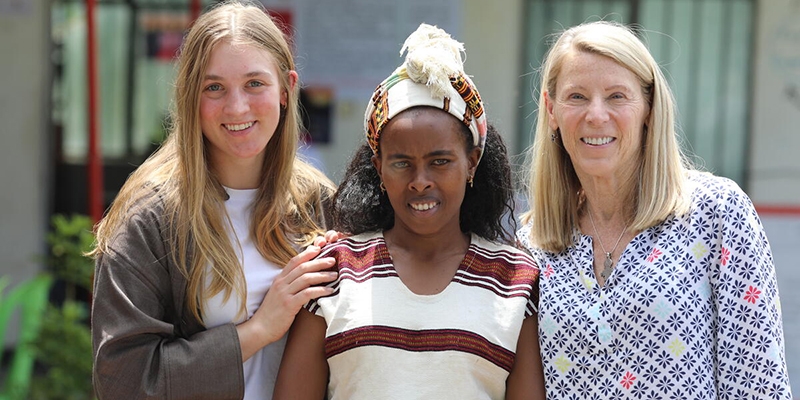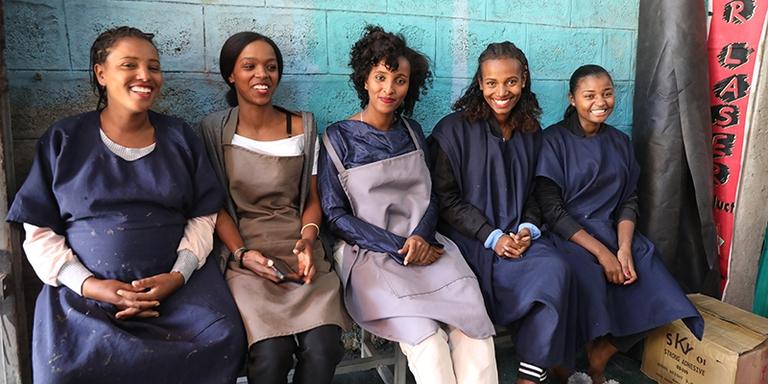
LEEP donors Elsa Louise Soderberg (left) and former 91˛Öżâ CEO Carolyn Miles (right) met Aberash, a mother of two who credits the project with providing the training and support she needed to open her own laundry shop.Â
Women Creating Change in Ethiopia, One Business at a Time
by Elsa Louise Soderberg Philanthropy Director, Elsa & Peter Soderberg Charitable Foundation
During my recent travels to the Sidama and Oromia regions of Ethiopia, I had the privilege of speaking with graduates of 91˛Öżâ’s Young Women’s Leadership and Economic Empowerment Program (LEEP) Academies. The women entered the program in 2020 as fledgling entrepreneurs. Many had already overcome numerous obstacles to participate, including their own self-doubt, which I’d seen while visiting three years ago prior to the start of LEEP. Â
Now, there was a sparkle in the women’s eyes and a palpable sense of ambition, ferocity and, most notably, a strong sense of self and self-worth. While we didn’t understand one another, it didn’t take a common language to appreciate the newfound confidence these young and empowered women exuded
I met a group of young women who were able to build a shoemaking business that employs 12 full-time employees and 10 part-time staff through LEEP. The leader of the business also employs her husband! Through LEEP, he had participated in a “Husband School” and was beaming as he told us about his wife’s success.
The women had undergone extensive training that covered much more than the hard skills needed to scale and diversify a small business. LEEP is not just a livelihoods program. It’s a holistic intervention that also focuses on leadership skills, sexual and reproductive health education and rights, and gender equity principles – with the ambitious goal of dismantling the biggest barriers curbing the potential of young Ethiopian women

With support from LEEP, these young women have expanded their shoemaking business in Hawassa, Sidama Region.Â

A two-day Husband School in Yirgalem, Sidama Region, included a lesson on food preparation.
Unleashing Bold Ambitions
Nestled in the Horn of Africa, Ethiopia is a beautiful country that boasts the second-largest youth population in Africa. Amid the many challenges posed by drought and war, the majority of young people are unemployed or underemployed, and the teen pregnancy rate is about 24%.
On top of all that, young women face potentially crippling gender inequality perpetuated by culture, societal norms and the structures supporting civil society. Yet I have seen the young women of Ethiopia rise above these seemingly insurmountable hardships and change the course of their lives, and the lives of their children, for the better.
The entrepreneurial ecosystem that LEEP is fostering is truly transformational. LEEP addresses the convoluted issue of access to capital by providing loan guarantees and removing the collateral requirement that often precludes women from obtaining loans in the first place.
To address the high pregnancy rate among teens and young women, LEEP provides access to sexual and reproductive health education and resources and facilitates referrals to local clinics for services.
In an effort to uproot negative gender norms, LEEP implements gender equity training and Husband Schools, where men learn about the burden their wives, sisters and mothers carry and how to help with basic household chores and child care. More men are beginning to view their wives as equals, appreciate their contribution to society, and support them in their business ventures – which in turn benefits the household.
From Ripples to Waves of Change
The cascading effect of transforming gender norms is reaching the next generation. Young girls are being encouraged to complete their education and start small businesses of their own. Young boys are growing up seeing their sisters as equal. Children have more food on the table due to higher household income.
The impact of LEEP stretches far beyond the first cohort of 711 graduates – 95% of whom reported increased income following the training. Successful businesses generate jobs and strengthen the economy in the communities LEEP serves.
Government support and buy-in are crucial to sustaining the program. We met with government representatives who reiterated their commitment to the cause and are already providing in-kind support by way of meeting spaces and trainings. As LEEP scales, it is the hope that more activities will be transferred to the government bureaus and organizations serving youth.Â
Building on the success of this pilot program, 91˛Öżâ is launching LEEP 2 with even bigger ambitions to reach 8,900 youth and expand to the urban center of Addis Ababa.
Mulatua shared what the program has meant to her. She expanded her woodworking business, which her husband previously engaged in without her. The couple recently welcomed a new daughter. When we asked the baby’s age, Mulatua told us she was just a few months old. She stood up, went back into her home, and returned with the baby girl.
She had named her Elsa, after my grandmother and co-president of the Elsa & Peter Soderberg Charitable Foundation, the organization that co-created LEEP with 91˛Öżâ. This is a touching and deeply personal testament to the impact that LEEP has had on the lives of its participants and their families.

I cannot wait to see what successes and learnings LEEP 2 will bring for the women, families, and children like Elsa!
The Elsa & Peter Soderberg Charitable Foundation (EPSCF) is guided by the conviction that it often takes a lead funder to catalyze bold, innovative and scalable solutions. We identify and work in tandem with NFP and NGO organizations that are driven to tackle specific and important problems that align with our areas and geographies of interest. We seek to apply our experiential and financial resources through strategic project selection, co-creation and grant structuring.
We welcome new partners to join us in this work as we expand. Please feel free to contact me at [email protected]Â or Diana Sarro at 91˛Öżâ at [email protected].
Photos: Seifu Asseged and 91˛Öżâ
